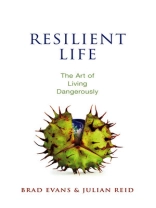What does it mean to live dangerously? This is not just a
philosophical question or an ethical call to reflect upon our own
individual recklessness. It is a deeply political issue,
fundamental to the new doctrine of ‘resilience’ that is
becoming a key term of art for governing planetary life in the 21st
Century. No longer should we think in terms of evading the
possibility of traumatic experiences. Catastrophic events, we are
told, are not just inevitable but learning experiences from which
we have to grow and prosper, collectively and individually.
Vulnerability to threat, injury and loss has to be accepted as a
reality of human existence.
In this original and compelling text, Brad Evans and Julian Reid
explore the political and philosophical stakes of the resilience
turn in security and governmental thinking. Resilience, they argue,
is a neo-liberal deceit that works by disempowering endangered
populations of autonomous agency. Its consequences represent a
profound assault on the human subject whose meaning and sole
purpose is reduced to survivability. Not only does this reveal the
nihilistic qualities of a liberal project that is coming to terms
with its political demise. All life now enters into lasting crises
that are catastrophic unto the end.
Inhoudsopgave
Preface and Acknowledgements ix
1 Anthropocene 1
2 Insecure by Design 38
3 The Poverty of Vulnerability 68
4 Living Dangerously 91
5 Atmos 120
6 Endgames 141
7 The Art of Politics 167
Notes 204
Select Bibliography 223
Index 231
Over de auteur
Brad Evans is Senior Lecturer in International Relations at the University of Bristol
Julian Reid is Professor of International Relations at the University
of Lapland, Finland












